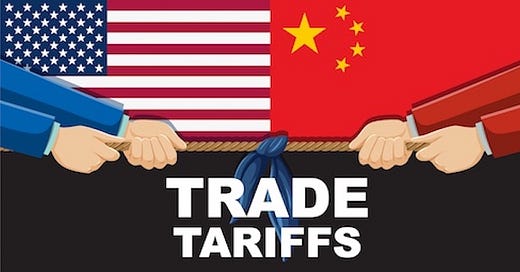Future of Global Stability: Is a US-China Conflict Inevitable?
A couple of weeks ago, I mentioned that China brazenly circumnavigated Australia and did live-fire exercises, necessitating some airliners to divert their flights. Australia's response was meek, with little push-back. I haven't heard President Trump comment about China's intimidation. This was a test by China to see what would be a likely response if it moved against Taiwan. All Trump stated was that he intended to impose tariffs on China. Does Trump think China will acquiesce to American demands?
This response from China's embassy on X is not very reassuring.
"If war is what the US wants, be it a tariff war, a trade war or any other type of war, we're ready to fight till the end,"
You see, China has reached the point now where it is no longer some secondary world power wannabe. On several metrics, it is the world's number one economic power. On a day-to-day basis, you can see the impact of China. If we look at the situation of electric vehicles in the Australian market, Tesla only entered it 11 years ago. We have been flooded with Chinese electric cars for the past few years. They are now outnumbering Teslas. You could argue that Tesla is a Chinese vehicle since there is a massive plant near Shanghai where they are produced.
While some contend that people are getting out of their electric vehicles in the U.S., I saw Teslas everywhere when I was there 10 months ago. I will be there again in May, so seeing the number of EVs on the road will be interesting.
Remember when Detroit was the centre of the world's auto industry in the 1950s through the 70s? Those days are gone. In fact, the days of America being the preeminent manufacturing power are gone. After World War 2, the U.S. was dominant, especially after the defeat of the Nazi regime. Today, China is in the number one position, as evidenced by this chart of manufacturing by country.
Australia is way down on the list with $90 billion, even surpassed by Switzerland, which only has a population of 5 million. It's a far cry from where Australia was 50 to 100 years ago. It had a flourishing car industry and used to make appliances and TVs. Today, we don't make much. We dig holes in the ground and ship resources and minerals to places like China. We're essentially a unidimensional economy.
The ratio of national debt to GDP has deteriorated for the U.S. According to World Economics, the U.S. ratio is 113%. China, on the other hand, is 72%. Considering it's not a time of war, the figure for the U.S. is not good.
Then there is Ferguson's Law, described by Sir Niall Ferguson––no relation. The Law states that except for rare instances if a superpower reaches the point where the interest on debt exceeds its defence spending, the country inevitably declines because it can't muster the resources to retain its role as a superpower. The crossover point where payment on debt exceeds spending on the military is the Ferguson limit. The limit was crossed n 2024.
In 2024, the interest payments on the U.S. debt reached $1.049 trillion. Meanwhile, defence spending for the same year was $842 billion. So, paying the interest on debt exceeds defence spending by over 200 billion dollars. This is clearly a sign of impending doom if not rectified.
The Chinese Navy has almost doubled the number of ships to the U.S., and in areas where they lag, they are rapidly closing the gap.
"Today, Jiangnan Shipyard alone has more capacity than all U.S. shipyards combined, and China's broader naval shipbuilding capacity is over 230 times larger than that of the United States." - The Center For Strategic Studies.
China is now a superpower, weaker in some areas than the U.S. but stronger in others. We've been hearing for some years about the 'coming collapse of China', such as the book by that name from Gordon Chang. He wrote it in 2001 and predicted the collapse would happen by 2011. Then he said he was off by a few years. It sounds like the climate change predictions of the polar ice caps melting by a certain year. They keep moving the goalposts when the predictions don't eventuate.
China is also rapidly assuming leadership in the field of Artificial Intelligence, which is the wave of the future. As of this fall, the country is forging ahead with compulsory studies in AI starting in primary school.
So, China has been watching the West's response to Russia's invasion of Ukraine and to its recent incursions not only around Australia but also in the South China Sea. China could easily blockade Taiwan without firing a shot, which would put the majority of the semiconductor chips to the West at risk. Of course, China's ultimate goal is to assume sovereignty over Taiwan since it considers it a renegade province.
Many now believe that at best, if America entered a war with China over Taiwan, it would be a draw; at worst, America would lose, or possibly more likely, given Trump's rhetoric about foreign wars, the U.S. would stay out of it and negotiate some mutual arrangement with China.





